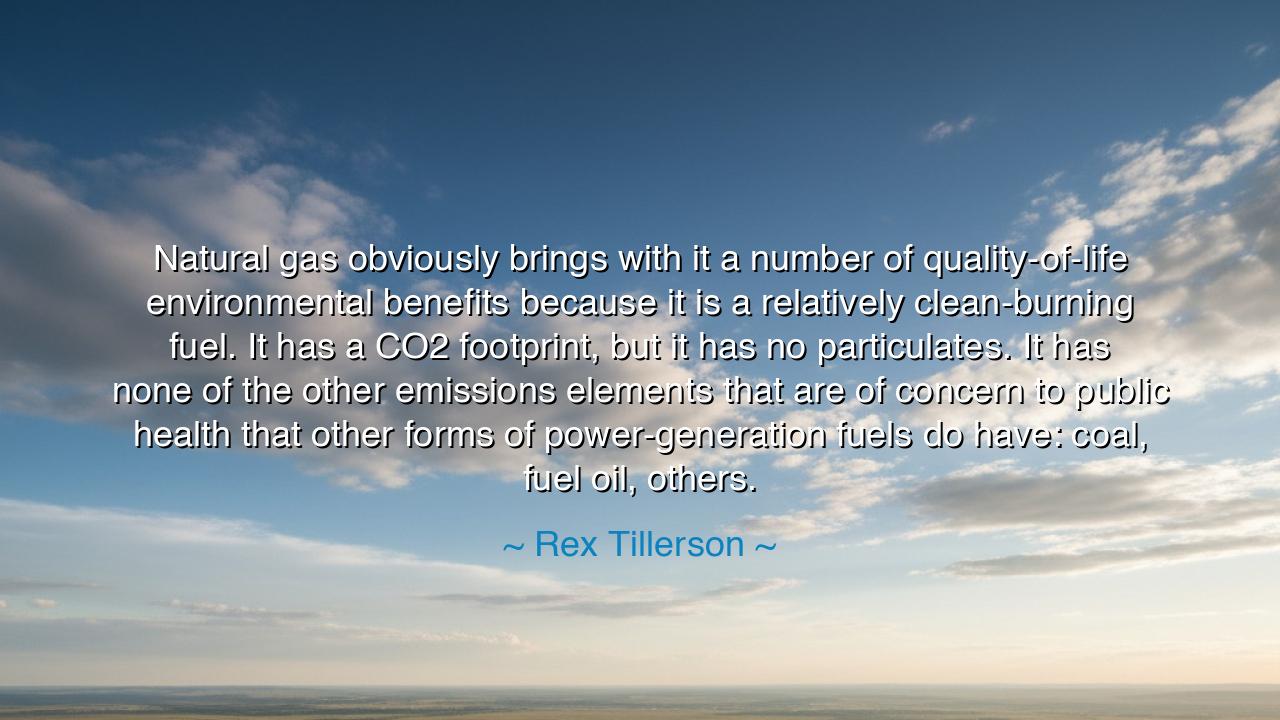
Natural gas obviously brings with it a number of quality-of-life
Natural gas obviously brings with it a number of quality-of-life environmental benefits because it is a relatively clean-burning fuel. It has a CO2 footprint, but it has no particulates. It has none of the other emissions elements that are of concern to public health that other forms of power-generation fuels do have: coal, fuel oil, others.






Hear, O children of fire and earth, the words of Rex Tillerson, who declared: “Natural gas obviously brings with it a number of quality-of-life environmental benefits because it is a relatively clean-burning fuel. It has a CO2 footprint, but it has no particulates. It has none of the other emissions elements that are of concern to public health that other forms of power-generation fuels do have: coal, fuel oil, others.” In these words lies the recognition of a paradox: that though all fuel leaves its mark upon the earth, some wounds are lighter than others, and some flames burn with fewer poisons.
The meaning of this saying is clear: among the fuels that power our age, natural gas stands as a lesser evil. It is not without consequence, for it releases carbon dioxide, and thus it adds to the burden of the skies. Yet unlike coal and fuel oil, it does not choke the lungs with soot, nor spread particulates that darken the air and shorten the lives of children. Tillerson’s words remind us that while perfection has not been attained, some choices preserve life and health more than others.
The ancients knew such distinctions well. When men first discovered fire, they saw that not all flames were equal. The burning of damp wood filled huts with smoke and sickness, while the clean flames of dried timber gave light without choking breath. So too in Rome, great aqueducts were constructed not only for wealth and luxury, but because polluted waters brought plague. The wise among the ancients always asked: not only how to live, but how to live with health. Tillerson’s reflection follows in this path, recognizing that the fuels of industry must be judged not only by their power, but by their cost to public health.
History gives us vivid examples of these costs. In the days of the Industrial Revolution, cities like London were blackened by coal smoke. The infamous “Great Smog” of 1952 killed thousands in a matter of days, as the thick soot of coal fires poisoned the air so completely that men and women could scarcely see their own hands before their faces. Here we learn that progress without care for emissions is no blessing but a curse. Against such shadows, natural gas has appeared as a cleaner path, burning without soot, sparing the air from the choking weight of particulates.
Yet Tillerson’s words, while acknowledging the benefits of natural gas, also remind us that it is not innocent. Its CO2 footprint binds it still to the greater challenge of our age: climate change. It may spare the lungs in the present, but it burdens the atmosphere for the future. Thus it stands as a bridge, but not the final road—a fuel that may buy time for humanity to move toward renewables, but not one that can be the destiny of the earth.
The lesson for us is twofold. First, embrace progress where it lessens suffering: support transitions from coal and oil toward fuels that do less harm, that spare both the breath of the living and the waters of the earth. But second, do not be lulled into complacency by partial victories. Remember that even “clean-burning” fuels bear costs, and that true stewardship requires a path beyond them, toward energies that do not burden the sky at all—sun, wind, and the deep currents of the earth.
Therefore, O listener, live with wisdom in the age of power. Support policies that protect public health, that replace the dirtiest fuels with cleaner ones. Yet also raise your voice for the long vision, that we may not be trapped forever in half-measures. Teach your children that progress is not merely in convenience, but in harmony with the air, the water, and the soil.
So let Tillerson’s words remain in memory: natural gas is cleaner, but not pure. It may light the way for a time, but the true destination lies further still. Let us walk that path with courage, until the fires we kindle no longer poison the world, but shine as companions of life itself.






AAdministratorAdministrator
Welcome, honored guests. Please leave a comment, we will respond soon